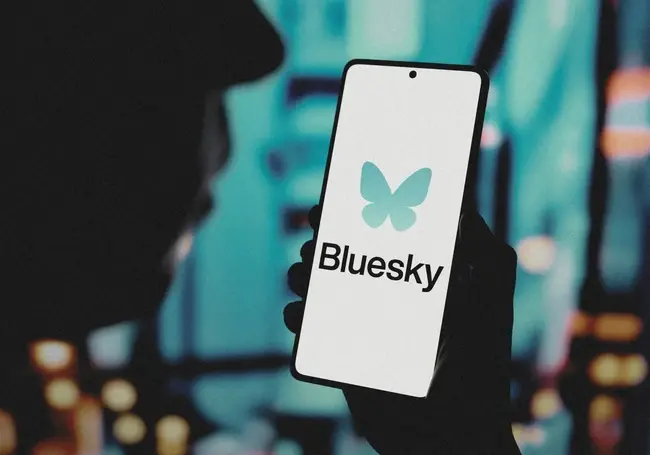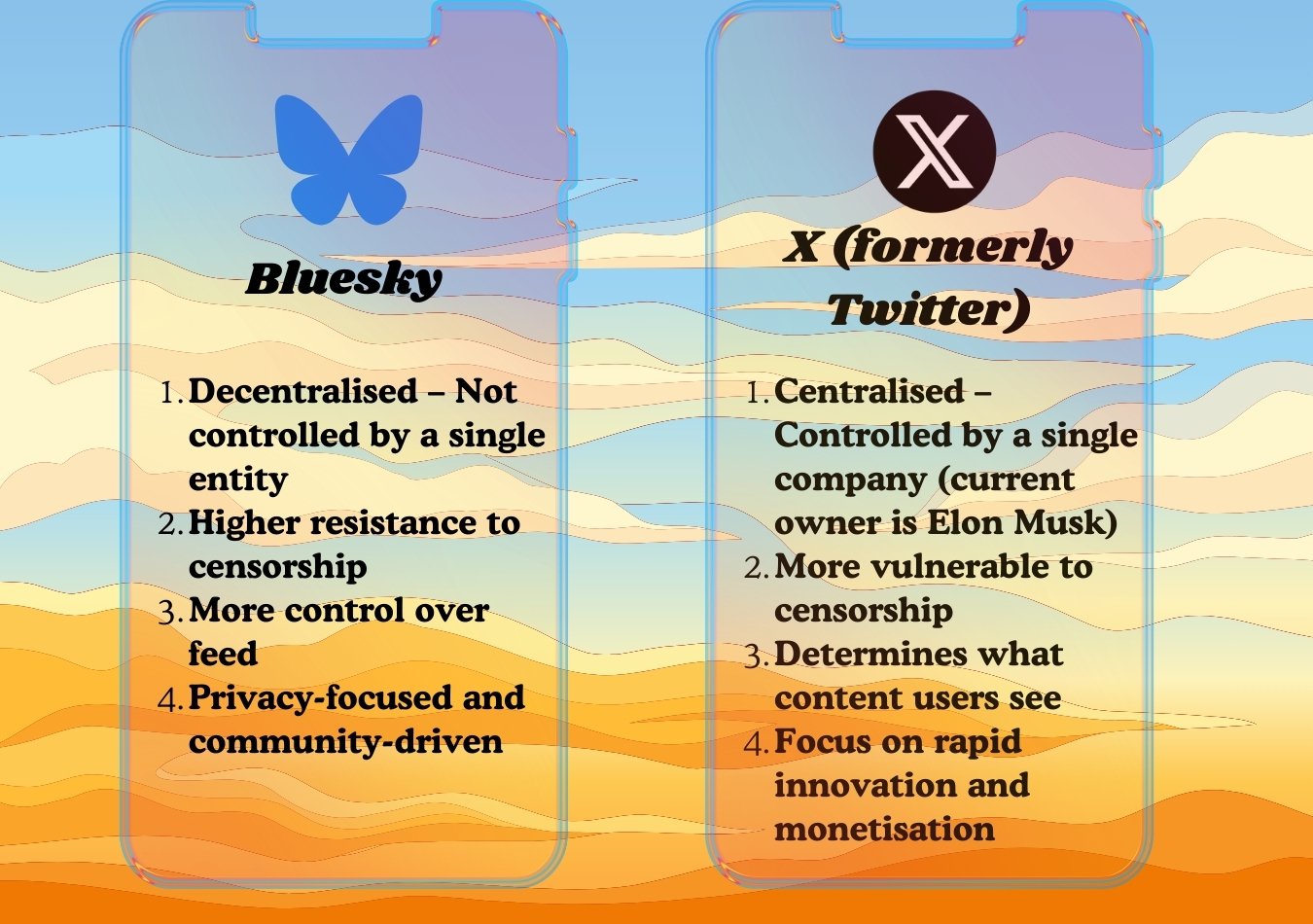Elon Musk-owned X (formerly Twitter) is faced with a new rival and it’s not Mark Zuckerberg’s Threads by Meta.
Bluesky announced in December 2019 founded by the former CEO of Twitter, Jack Dorsey began this project to decentralise X.
Bluesky overnight gained over a million sign-ups.
On November 14, 2024, the company announced that over 1 million people signed up for the platform in the last 24 hours. Bluesky has officially crossed its user base of 16 million as of last week.
This announcement comes soon after Instagram head Adam Mosseri recently revealed that Threads too had gained over 15 million new users in November alone.

It seems users are steering away from Musk-owned X, especially in the past few months. X was banned in Brazil and many have their reservations because of Musk supporting Donald Trump, the new US President.
Forbes reported that users are deleting X because of the platform’s new terms of service which are bad for privacy. The movement to drop out of X kicked-started full-scale on November 15, 2024, when the new terms of service came into effect.
The terms stated that all users must agree to let their posts be trained by artificial intelligence, including its own service Grok. It was previously possible to opt out of this.
Now Bluesky is at the top of the charts in the App Store in the US which is followed by ChatGPT and Threads.
While Bluesky may not have the massive user base of Threads (over 275 million active user base) or X, its users are way more active, according to CEO Jay Graber.
In a post, Graber stated, “We also have a higher percentage of posters than most social sites, which follow a 90-9-1 pattern of lurkers-commenters-posters. We haven’t dipped below ~30% posters.”
TechCrunch reported that Bluesky raised $15 million in Series A funding last month led by Blockchain Capital with participation from Alumni Ventures, True Ventures, SevenX, Darkmode’s Amir Shevat, and Kubernetes co-creator Joe Beda.
The company is planning to launch subscriptions soon. The exact dates are unknown as of now.
This article tells you everything you need to know about Bluesky, what it is, why it could be an important tool for enterprises and how to use it.
Read: Meta Bans Students’ Social Media Accounts Tracking Celeb Private Jets
What is Bluesky?
Akin to X, Bluesky is also a social network platform created by Jack Dorsey, the former CEO of Twitter (now X). His aim was to build a decentralised social media platform that gives users the opportunity to have a more open online experience.
Bluesky describes itself as an open social network that gives creators independence from platforms, developers the freedom to build, and users a choice in their experience.
Bluesky is still relatively new, but it has already gained a significant following, particularly among those who are looking for an alternative to Twitter. In just 24 hours, the platform gained over 1 million sign-ups, crossing the mark of 16 million users total.
Read: Twitter Lost Over Half a Billion Visitors Last Month, New Figures Show
👋 Bluesky is an open social network that gives creators independence from platforms, developers the freedom to build, and users a choice in their experience. We're so excited to have you here! We share Bluesky updates & news from this account. A quick orientation thread: 🧵✨
— Bluesky (@bsky.app) 17 October 2024 at 08:06
Why is Bluesky important for Business?
Considering that Bluesky was designed to be a decentralised model that prevents from a company monopolising on the data. Instead, it gives users control letting them choose how they want their data managed and what they wish to view on their social media feed.
Like most other social media platforms, Bluesky too offers business opportunities to engage with their audience but more authentically and in a decentralised way. As a relatively early adopter of Bluesky, enterprises can build genuine niche relationships with their audience by fostering trust and open conversations.
Owing to Bluesky's decentralised nature, enterprises too have greater control over their online presence, reducing reliance on a single platform and mitigating risks associated with potential platform changes or disruptions.
How Bluesky Works?
Bluesky has been built on the AT Protocol (also called atproto) which is a federated protocol for large-scale distributed social applications. Essentially social media platforms’ users are recognised by domain names creating domains which become cryptographic URLs. This helps protect users’s account and their individual data.
Through this approach, users including enterprise accounts can make their own decisions about data, allowing them to set their own rules. As part of the AT Protocol, user data is exchanged in signed data repositories which are collections of records including posts, comments, likes, follows, media blobs and more.
As a result, Bluesky users can do more than just post and share content, they can also create their own small niche communities. Additionally, since Bluesky is not controlled by just one company, it makes the platform more resilient to censorship and manipulation.
The platform has a highly user-friendly interface and lets users sign up easily. Simply go to the website and sign up with an existing email address or a new one.
Read: What happened to We Heart It? How the Tumblr Rival Died
How to Join Bluesky?
It’s quite straightforward to join Bluesky. Users can either download the mobile application or open the Bluesky website on a web browser. Follow the instructions to sign up:
- Create an account on the app or the website by following the on-screen instructions to create an account. Users will be asked to provide basic information like your email address and a password.
- Profile setup where users are asked to select a username and set up their profile picture. They can also customise their profile further by adding a bio and other details.
- You’re in, begin exploring Bluesky and its features. For instance, users can follow other users, join communities, and post their own content similar to Twitter.
How to Use Bluesky?
When the user has signed up and created a user handle, they can begin using Bluesky. The users will be presented with a few prompts by the platform which will ask them to choose their interests.
Choosing interests like animals, art, books, comedy, software development science, politics, tech and a lot more can drive users to their relevant audience. Bluesky can then suggest potential accounts individual users can choose to follow relevant to their interests.
This interest-oriented approach allows users to have a customised feed by selecting the ‘Home’ option on the left side of the web browser or the ‘Home’ icon on the mobile app.
To post content, users simply have to select ‘New Post’ on the left-hand side of the browser or select the blue icon on the mobile app. They can then type a post and add an image if needed and then click ‘Post’ to publish the content.
Users can reply to their own posts or other users’ posts. They can also mute a post or the post thread if the post content is objectionable. If the post is offensive, users can report it to Bluesky. To report a post, users will have to select a category presenting options like spam, unwanted content, copyright violations and more. They can add further details and send it to Bluesky instantly.
Bluesky Features
1. Decentralised Interface
Bluesky stands out from most other social media platforms because of its decentralised architecture. It’s not controlled by a single entity, ensuring more privacy, data security and resistance to censorship for modern-day users.
2. Custom Feeds
Bluesky enables users to customise their social media feeds by letting them choose the algorithm. Selecting the algorithm will show them what they want to see, unlike other social media platforms where algorithms drive what users should see.
This means users only see content that is relevant to their interests, rather than being bombarded with content that they don't care about. This is especially beneficial for enterprises who are seeking a niche audience, Bluesky would be able to help them connect with their relevant audience.
3. Account Portability
Bluesky user accounts are portable too which means individual users can remove their data if they decide to leave the platform. This makes it easier for users to switch between different social media platforms without losing their content or connections.
4. Open-Source
Bluesky embodies a transparent philosophy and has made its organisation open-source. This means that its code is publicly available for anyone to see and contribute to. It also makes the social media network more accountable to its users.
5. Anti-Toxicity Features
Bluesky’s anti-toxicity feature is a relatively new introduction to the application where users can protect themselves from mass abuse attacks. It has been designed to provide a more positive social networking experience to users.
The platform is equipped with the capabilities that let users detach quote posts, hide replies, and filter notifications. These characteristics can prevent “dogpiling” where suddenly a user’s post is met with negativity like digital attacks and other forms of online hate.
Paul Frazee, product developer and protocol engineer at Bluesky told Newsweek that "quote posts are often used to correct misinformation" too. He added that the social media platform is working on a labelling service, hoping to soon add a feature that has the same effect as X's Community Notes feature.





Comments ( 0 )